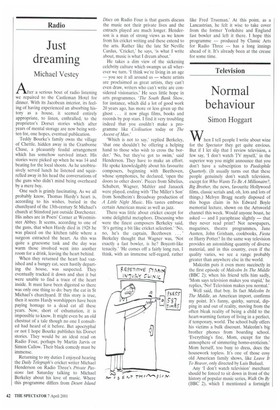Just dreaming
Michael Vestey
Ater a serious bout of radio listening we repaired to the Castleman Hotel for dinner. With its Jacobean interior, its feeling of having experienced an absorbing history as a house, it seemed entirely appropriate, to listen, enthralled, to the proprietor's Dorset stories which after years of mental storage are now being written for, one hopes, eventual publication.
Teddy Bourke's family owns the village of Chettle, hidden away in the Cranbome Chase, a pleasantly feudal arrangement which has somehow survived intact. His stories were picked up when he was 14 and beating for the local shoots. As he unobtrusively served lunch he listened and squirrelied away in his head the conversations of the guns who didn't mind being overheard by a mere boy.
One such is grimly fascinating. As we all probably know, Thomas Hardy's heart is, according to his wishes, buried in the churchyard of the 13th-century St Michael's church at Stinsford just outside Dorchester. His ashes are in Poets' Corner at Westminster Abbey. It seems, according to one of the guns, that when Hardy died in 1928 he was placed on the kitchen table where a surgeon extracted the heart. As this was quite a gruesome task and the day was warm those involved went into another room for a drink, leaving the heart behind.
When they returned the heart had vanished and a hungry cat, seen hastily departing the house, was suspected. They eventually tracked it down and shot it but were unable to find a trace of the heart inside. It must have been digested so there was only one thing to do: bury the cat in St Michael's churchyard. If this story is true, then it seems Hardy worshippers have been paying homage to a dead cat all these years. Now, short of exhumation, it is impossible to know. It might even be an old chestnut of a tale though no one I consulted had heard of it before. But apocryphal or not I hope Bourke publishes his Dorset stories. They would be an ideal read on Radio Four, perhaps by Martin Jarvis or Simon Callow. Their black comedy must be immense.
Returning to my duties I enjoyed hearing the Daily Telegraph's cricket writer Michael Henderson on Radio Three's Private Passions last Saturday talking to Michael Berkeley about his love of music. Where this programme differs from Desert Island Discs on Radio Four is that guests discuss the music not their private lives and the extracts played are much longer. Henderson is a man of strong views as we know from his cricket writing and these extend to the arts. Rather like the late Sir Neville Cardus, 'Cricket,' he says, 'is what I write about, music is what I dream about.'
He takes a dim view of the sickening celebrity culture which swamps us all wherever we turn. 'I think we're living in an age — you see it all around us — where artists are proclaimed as great artists, they can't even draw, writers who can't write are considered visionaries.' He sees little hope in arts programmes. 'The South Bank Show, for instance, which did a lot of good work 20 years ago, has more or less given up the ghost . . . it now plugs films, books and records by pop stars. I find it very troubling indeed that you couldn't make a programme like Civilisation today or The Ascent of Man.'
'Which is not to say,' replied Berkeley, 'that one shouldn't be offering a helping hand to those who wish to cross the border."No, but they've got to swim,' said Henderson. They have to make an effort. He spoke knowledgably about his favourite composers, beginning with Beethoven, whose symphonies, he declared, 'open the doors to other doors'. Pieces from Sibelius, Schubert, Wagner, Mahler and Janacek were played, ending with 'The Miller's Son' from Sondheim's Broadway production of A Little Night Music. His tastes embrace certain American music as well as jazz.
There was little about cricket except for some delightful metaphors. Discussing who were the finest composers Berkeley said, 'It's getting a bit like cricket selection."No, no, he's the captain, Beethoven . . . ' Berkeley thought that Wagner was, 'Not exactly a fast bowler, is he? Boycott-like tenacity.' He comes off a fairly long run, I think, with an immense self-regard, rather like Fred Trueman.' At this point, as a Lancastrian, he felt it wise to take cover from the former Yorkshire and England fast bowler and left it there. I hope this programme — produced by Classic Arts for Radio Three — has a long innings ahead of it. It's already been at the crease for some time.


























































 Previous page
Previous page